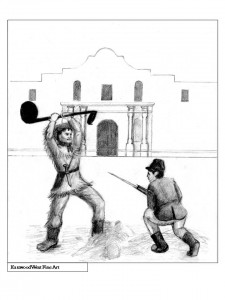A Slave For Details
Posted in General, On This Day on March 6th, 2010 by Eugene Finerman – Be the first to commentMarch 6, 1836: Selectively Remember the Alamo
The Alamo might have been the first celebrity reality show…Tune in to see Davy Crockett, Jim Bowie and their 187 roommates cope with the annoyances and stresses of living together under siege, bombardment and assault.
Unfortunately, the show would have had only 13 episodes and there were no possibilities for a second season.
On this day in 1836, the Alamo fell to the Mexican army. The ruined mission became the shrine of Texas’ Independence. But why exactly were the Texans fighting?
In 1835, the Mexican government adopted a new constitution, one that replaced a federation of states with a centralized government. Under the previous constitution, the province of Tejas and its immigrant population had enjoyed considerable autonomy.
For example, under the Mexican statutes for naturalization, the Americano migrants in Tejas were supposed to become Catholic. However, the loose federal system never enforced that theological requirement. But the new constitution was not interested in that either; in fact, it was Anti-Clerical and was more likely to prosecute anyone for being too Catholic.
No, the real manifestation of Mexican tyranny was the enforced abolition of a certain property right that obviously was cherished by the citizens of Tejas. Now what sacred cause would incite rebellion by Stephen Austin (from Virginia), Jim Bowie (from Louisiana), Sam Houston (from Tennessee), and Davey Crockett (from Tennessee)?
In Texas, independence was a relative term.
But, in triumphing over Mexico, the Texans got to keep their “property”, at least until 1865.
So, Remember the Alamo…just not the details.
